This article was medically reviewed by Mark Ziats, MD, PhD. Dr. Mark Ziats is an Internal Medicine Physician, Scientist, Entrepreneur, and the Medical Director of xBiotech. With over five years of experience, he specializes in biotechnology, genomics, and medical devices. He earned a Doctor of Medicine degree from Baylor College of Medicine, a Ph.D. in Genetics from the University of Cambridge, and a BS in Biochemistry and Chemistry from Clemson University. He also completed the INNoVATE Program in Biotechnology Entrepreneurship at The Johns Hopkins University - Carey Business School. Dr. Ziats is board certified by the American Board of Internal Medicine.
There are 15 references cited in this article, which can be found at the bottom of the page.
wikiHow marks an article as reader-approved once it receives enough positive feedback. This article received 70 testimonials and 98% of readers who voted found it helpful, earning it our reader-approved status.
This article has been viewed 1,036,836 times.
Research shows that bronchitis, or an inflammation of the bronchi in your lungs, can cause prolonged, excessive coughing.[1] This inflammation is usually caused by a virus, bacteria, allergies, or autoimmune diseases. Acute bronchitis is a one-time condition that lasts for several weeks, while chronic bronchitis is an ongoing condition that lasts at least several months or longer. Experts agree that while there are roughly 10–12 million visits to medical professionals every year for bronchitis, most cases turn out to be acute bronchitis, which can be treated at home and usually clears up on its own with proper care.[2]
Steps
Treating Bronchitis at Home
-
1Keep yourself hydrated.[3] Staying properly hydrated while sick helps your body to continue functioning properly. You should drink 8-oz (250 ml) of fluid every one to two hours.
- Staying hydrated helps to loosen congestion and maintain proper bodily functions.[4]
- If your doctor has restricted your fluid intake due to other medical complications, you should follow his or her instructions concerning hydration.
- Much of this fluid should be water or other low-calorie drinks to prevent yourself from taking in too many calories.
- Clear broth, diluted sports drinks, and warm lemon water with honey are other good options. Warm drinks have the additional benefit of soothing throats that are sore from excessive coughing.
- Do not consume drinks with caffeine or alcohol. These drinks are diuretics and cause dehydration.
-
2Get plenty of rest. Strive to get as much sleep as possible. You should aim to get at least seven hours of sleep per night, but if your illness prevents you from sleeping through the night, you should at least rest by lying with your head down or propped up.
- Sleep is a vital part of maintaining strong immune function.[5] Without enough rest, your body will be unable to fight the virus.
Advertisement -
3Limit the amount of physical activity you do while you have bronchitis. Basic tasks are usually fine, but you should avoid moderate or active exercise. This degree of activity can trigger coughing fits and wear away at your body's immune system.
-
4Use a humidifier.[6] Turn the humidifier on at night and sleep with it running. Breathing in warm, moist air will loosen mucus in the airways, making it easier to breathe and reducing the severity of your coughs.
- Clean the humidifier based on the manufacturer's instructions. If you fail to clean the humidifier, bacteria and fungi can grow inside the water container and distribute itself in the air. Bacteria or fungi in the air can complicate the bronchitis.
- You could also sit in a closed bathroom with hot water running out of the shower for 30 minutes. The steam produced by the water will work in the same way as the vapor produced by the humidifier.
-
5Avoid irritants. Pollution and cold air can make the condition worse. While you probably can't eliminate exposure to all pollutants, there are some you can easily avoid.
- Stop smoking and do not place yourself around others who do smoke. Smoke is a major lung irritant, and smokers are the most likely to develop chronic bronchitis.
- Wear a mask when you anticipate being exposed to paint, household cleansers, perfume, or other strong, potent fumes.
- Wear a face mask outside. Cold air can restrict your airways, worsening your cough and making it difficult to breath. Wearing an outdoor face mask will warm the air before it reaches your airways.
-
6Take cough medicine only when needed.[7] An over-the-counter cough syrup should only be used if the cough becomes so disruptive that it interferes with your daily life. Under ordinary circumstances, you want your cough to be as productive as possible to prevent excess mucus from sitting in your lungs and causing further infection. For that reason, cough syrups and similar suppressants should not be used consistently throughout the length of the illness.
- Cough syrups are usually suppressants. They suppress or restrict coughs, and as a result, you will cough less and produce less phlegm.
- If you cannot sleep due to a cough or if you are coughing so much that it becomes painful, you can alternate a cough suppressant with other medication to provide temporary relief.
- It is recommended that you consult with your doctor before taking a cough syrup, but these medicines can be obtained without a prescription.
-
7Use an expectorant. An over-the-counter expectorant will cause you to cough up more mucus. The risk of developing pneumonia or other severe infections is increased in patients with bronchitis due to the amount of excess mucus produced. Use of an expectorant is often recommended in order to expel this excess mucus, especially if you have non-productive coughs.
-
8Do some research on herbal remedies. Be sure to talk to your doctor prior to taking any. there is no scientific evidence that herbal remedies are effective treatments for acute bronchitis, but they have been shown to not be harmful; however, some preliminary studies have shown that South African geranium (Pelargonium sidoides) demonstrated positive results. One study has shown that people recover faster when taking this remedy as opposed to taking a placebo.
- Common colds can lead to bronchitis, so taking herbal remedies that help prevent colds can also help prevent bronchitis. Some herbals remedies that have been studied that have shown some promising results include; echinacea (300 mg three times daily), garlic, and ginseng (400 mg/day).
Getting Professional Medical Treatment
-
1Know when to see the doctor. If your bronchitis symptoms last for more than one week without any sign of improvement, make an appointment with your physician. Additionally, if your symptoms are getting progressively worse, consult your doctor.
- Schedule an appointment with your doctor if your cough persists for over one month.
- Call the doctor as soon as possible if you begin coughing up blood, having difficulty breathing, developing a fever, or feeling especially weak or ill.[8] You should also schedule an appointment if your feet begin to swell, as congestive heart failure can cause backup of fluid into the lungs, resulting in a chronic cough. Sometimes people mistake this for bronchitis.
- Contact your doctor if you begin coughing up a bad-tasting fluid. This is usually caused by stomach acid coming up from the stomach and dripping down into the lungs during sleep. A doctor will prescribe an acid-reducing medication to deal with this particular type of bronchitis.
-
2Discuss antibiotics with your doctor. A doctor may prescribe an antibiotic if he or she suspects that a bacterial infection is setting in. Be aware that there is no concrete evidence that antibiotics are helpful in the resolution of acute bronchitis if it is viral, not bacterial.[9]
- Under normal circumstances, a doctor will not prescribe an antibiotic. Bronchitis is most commonly caused by a virus and antibiotics only fight bacterial infections.
- If you begin coughing up more mucus or if that mucus becomes thicker, you may have a bacterial infection. This is when your doctor will usually prescribe an antibiotic as the appropriate treatment. These antibiotic treatments usually last anywhere from five to 10 days.
-
3Find out about prescription bronchodilators. These medications are usually used to treat asthma. They might be prescribed if your bronchitis makes it difficult to breathe.
- A bronchodilator generally comes in the form of an inhaler. The medicine is sprayed directly into the bronchial tubes, where it opens the tubes and clears out mucus.
-
4Consider checking into pulmonary rehabilitation.[10] If you have chronic bronchitis, you may need long-term therapy to strengthen your weakened lungs. Pulmonary rehabilitation is a special breathing exercise program. A respiratory therapist works with you one-on-one, designing an exercise plan that will slowly build up your lung capacity while helping you to breathe more easily.
Understanding Bronchitis
-
1Understand bronchitis. This condition can affect all ages and does not affect any gender more than the other. Bronchitis is characterized by inflammation of the bronchi and bronchioles due to an infection or chemical irritant.[11] It results from either a bacterial, viral, or chemical catalyst.
- This article will deal with the more common acute bronchitis, as chronic bronchitis is a separate medical condition that usually requires professional medical treatment. Acute bronchitis is a very common disease, in fact most people have had experience with it at some point. Almost all acute bronchitis cases resolve on their own at home with proper care, rest, and time.[12]
-
2Understand bronchitis treatment. This disease goes away on its own and requires no treatment with antibiotics, though a cough may linger for weeks beyond the disease. Treatment of acute bronchitis focuses on alleviating symptoms and resting in order to allow your body to take care of itself and to recover.[13]
- There is no definitive test for identifying bronchitis.[14] Doctors will usually diagnose bronchitis based on what symptoms you are presenting.
- Treatment and recovery from acute bronchitis usually occur at home completely unless further infections or complications set in.
-
3Know the symptoms of bronchitis. People presenting with acute bronchitis will usually describe a recent onset of cough. This occurs in the absence of other conditions such as asthma, COPD, pneumonia, or the common cold.[15]
- The typical cough of bronchitis is initially dry and unproductive. This can progress to a productive cough as bronchitis progresses. Throat and lung pain can occur from constant and intensely forceful coughing to relieve irritation.[16]
- In addition to a red throat (infected pharynx), most people present with additional symptoms: difficulty breathing (Dyspnea), inspiratory or expiratory wheezing, fever over 101.1°F (38.3°C), and fatigue.
-
4Know the risk factors for bronchitis. In addition to common symptoms, there are many risk factors involved that can increase the likelihood of bronchitis. These include: very young infants or very elderly people, air pollutants, smoking or secondhand smoke, environmental changes, chronic Sinusitis, bronchopulmonary allergy, HIV infection, alcoholism, and gastroesophageal reflux disease (GERD)[17]
- In healthy individuals, bronchitis is a self-limiting disease (meaning that your body can recover on it’s own without any specific treatment). In fact, most medical guidelines do not recommend antibiotics. If you have several lingering symptoms for more than a month and if you have any questions or concerns, consider visiting your doctor for a laboratory and/or imaging workup and professional treatment.[18]
Expert Q&A
-
QuestionAbout how much time does it take to go away?
 Luba Lee, FNP-BC, MSLuba Lee, FNP-BC is a Board-Certified Family Nurse Practitioner (FNP) and educator in Tennessee with over a decade of clinical experience. Luba has certifications in Pediatric Advanced Life Support (PALS), Emergency Medicine, Advanced Cardiac Life Support (ACLS), Team Building, and Critical Care Nursing. She received her Master of Science in Nursing (MSN) from the University of Tennessee in 2006.
Luba Lee, FNP-BC, MSLuba Lee, FNP-BC is a Board-Certified Family Nurse Practitioner (FNP) and educator in Tennessee with over a decade of clinical experience. Luba has certifications in Pediatric Advanced Life Support (PALS), Emergency Medicine, Advanced Cardiac Life Support (ACLS), Team Building, and Critical Care Nursing. She received her Master of Science in Nursing (MSN) from the University of Tennessee in 2006.
Board-Certified Family Nurse Practitioner Bronchitis typically lasts 1 - 2 weeks. However, it is not uncommon for bronchitis to last longer. If you have not had improvement after 2 - 3 weeks of treatment, see your healthcare provider.
Bronchitis typically lasts 1 - 2 weeks. However, it is not uncommon for bronchitis to last longer. If you have not had improvement after 2 - 3 weeks of treatment, see your healthcare provider. -
QuestionIs bronchitis curable?
 Luba Lee, FNP-BC, MSLuba Lee, FNP-BC is a Board-Certified Family Nurse Practitioner (FNP) and educator in Tennessee with over a decade of clinical experience. Luba has certifications in Pediatric Advanced Life Support (PALS), Emergency Medicine, Advanced Cardiac Life Support (ACLS), Team Building, and Critical Care Nursing. She received her Master of Science in Nursing (MSN) from the University of Tennessee in 2006.
Luba Lee, FNP-BC, MSLuba Lee, FNP-BC is a Board-Certified Family Nurse Practitioner (FNP) and educator in Tennessee with over a decade of clinical experience. Luba has certifications in Pediatric Advanced Life Support (PALS), Emergency Medicine, Advanced Cardiac Life Support (ACLS), Team Building, and Critical Care Nursing. She received her Master of Science in Nursing (MSN) from the University of Tennessee in 2006.
Board-Certified Family Nurse Practitioner Yes, bronchitis is an acute respiratory tract infection in which cough, with or without phlegm is a predominant feature. It usually lasts 1 - 2 weeks. It is typically treated with supportive therapy and sometimes an antibiotic. In most cases, it clears up without complications.
Yes, bronchitis is an acute respiratory tract infection in which cough, with or without phlegm is a predominant feature. It usually lasts 1 - 2 weeks. It is typically treated with supportive therapy and sometimes an antibiotic. In most cases, it clears up without complications.
Warnings
- Even mild illness can be cause for concern in older people. This becomes especially true if they are sick with another disease, such as influenza, chronic obstructive pulmonary disease (COPD), or congestive heart failure.⧼thumbs_response⧽
- When the children contract acute bronchitis, it is important to take into consideration other respiratory conditions that may also be involved. If any child presents with recurrent bronchitis, this could be a sign of some underlying condition or malformation of the respiratory tract. Additionally, immune deficiencies and chronic asthma should be evaluated by a doctor and taken into consideration. In very young children, viral acute bronchitis (caused by the respiratory syncytial virus) can be a fatal condition.[19] It is a good idea to consult with your doctor for any child suspected of having bronchitis.⧼thumbs_response⧽
References
- ↑ https://www.mayoclinic.org/diseases-conditions/bronchitis/symptoms-causes/syc-20355566
- ↑ https://www.ncbi.nlm.nih.gov/books/NBK448067/
- ↑ http://www.webmd.com/lung/cold-becomes-bronchitis?page=2
- ↑ http://www.mayoclinic.com/health/cold-remedies/ID00036
- ↑ http://www.health.harvard.edu/press_releases/importance_of_sleep_and_health
- ↑ https://www.mayoclinic.org/diseases-conditions/bronchitis/diagnosis-treatment/drc-20355572
- ↑ http://www.webmd.com/lung/understanding-bronchitis-treatment
- ↑ http://health.williams.edu/ephnotes-newsletter/general-health-concerns/theres-nothing-cute-about-acute-bronchitis/
- ↑ https://www.aafp.org/afp/1998/0315/p1270.html
- ↑ https://www.mayoclinic.org/diseases-conditions/bronchitis/diagnosis-treatment/drc-20355572
- ↑ Wenzel RP, Fowler AA. Clinical practice. Acute bronchitis. N Engl J Med. 2006;355:2125–2130. 2. Albert RH. Diagnosis and treatment
- ↑ Wenzel RP, Fowler AA. Clinical practice. Acute bronchitis. N Engl J Med. 2006;355:2125–2130. 2. Albert RH. Diagnosis and treatment
- ↑ Wenzel RP, Fowler AA. Clinical practice. Acute bronchitis. N Engl J Med. 2006;355:2125–2130. 2. Albert RH. Diagnosis and treatment
- ↑ https://www.aafp.org/afp/1998/0315/p1270.html
- ↑ Braman SS. Chronic cough due to acute bronchitis: ACCP evidence-based clinical practice guidelines. Chest. 2006;129:95S–103S
- ↑ Domino, F. (n.d.). The 5-minute clinical consult standard 2015 (23rd ed.).
- ↑ Domino, F. (n.d.). The 5-minute clinical consult standard 2015 (23rd ed.).
- ↑ http://www.emedicinehealth.com/acute_bronchitis/page5_em.htm
- ↑ Domino, F. (n.d.). The five-minute clinical consult standard 2015 (23rd ed.).
About This Article
To get rid of bronchitis, drink 8 ounces of fluid every 1-2 hours to keep yourself properly hydrated and be sure to get plenty of rest so your immune system can recover. Sleeping with a humidifier nearby and taking an over-the-counter expectorant medication can really help if you're having trouble loosening and coughing up mucus. If your bronchitis symptoms last for more than 1 week without any sign of improvement, make an appointment with your doctor as soon as possible. To learn about herbal remedies you can try, read on!

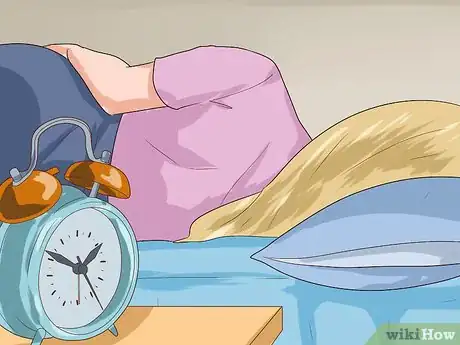

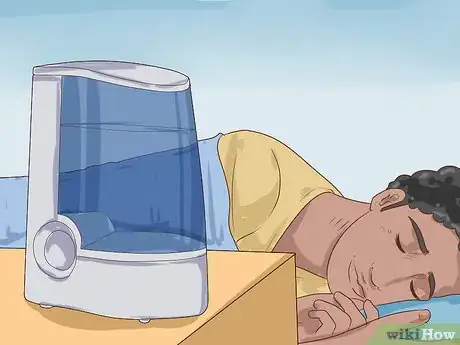
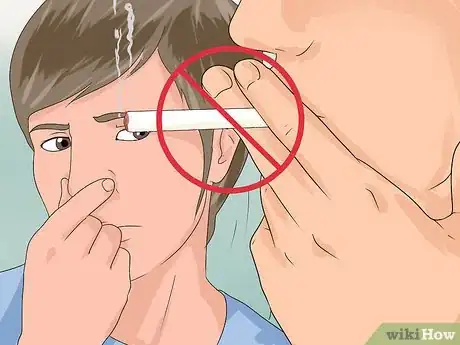
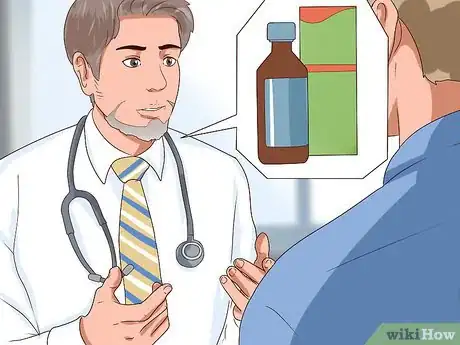
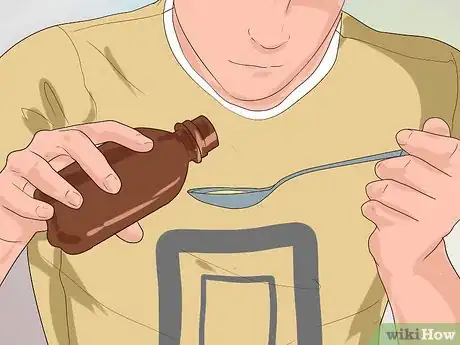

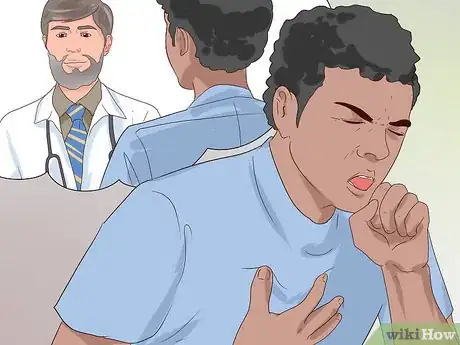
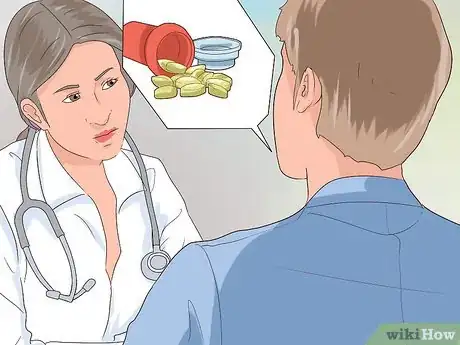
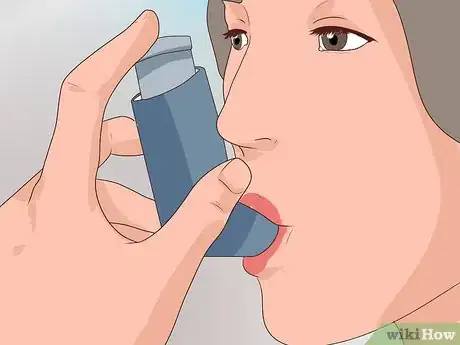
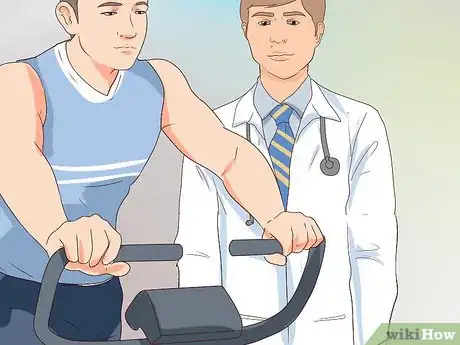
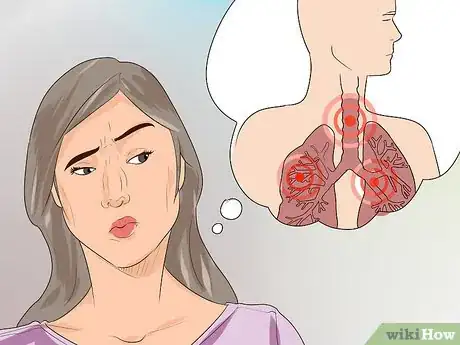
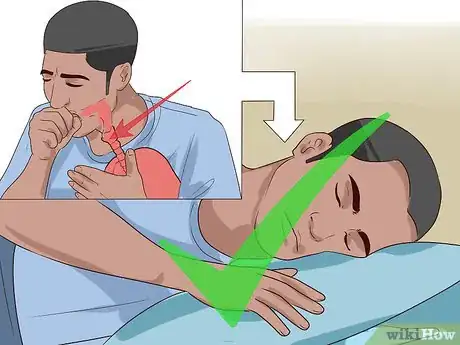
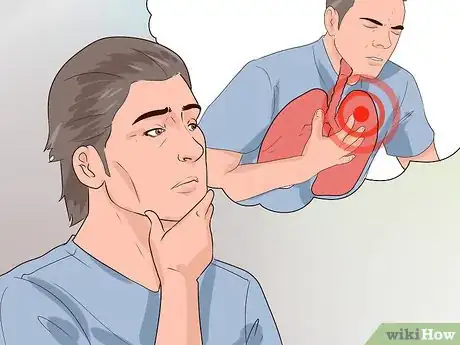
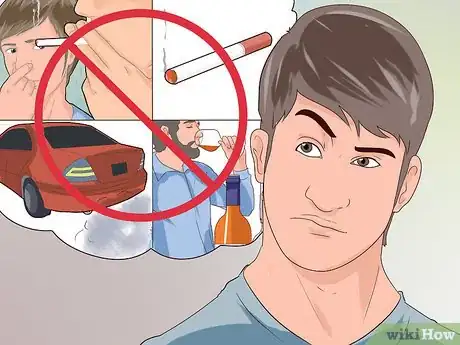

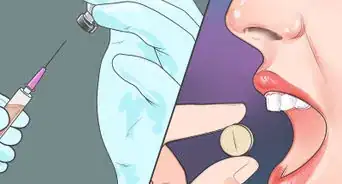

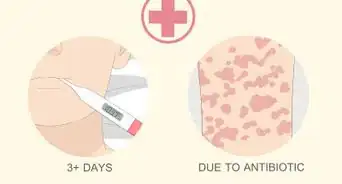






-Step-11.webp)
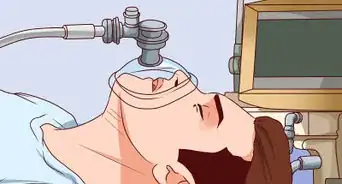
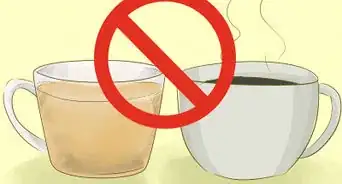













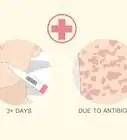



































Medical Disclaimer
The content of this article is not intended to be a substitute for professional medical advice, examination, diagnosis, or treatment. You should always contact your doctor or other qualified healthcare professional before starting, changing, or stopping any kind of health treatment.
Read More...